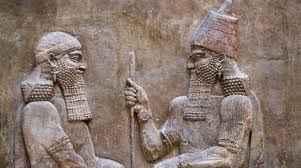Prophecies Concerning the Gentile Nations
46:1 to 49:33
Sometime between 605 and 601 BC
during the eleven-year reign of Jehoiakim
Jehoiakim, son of Josiah and two years older than Jehoahaz, was 25 years old when Necho, Pharaoh of Egypt, placed him on the throne in 609 BC. He reigned 11 years until 598 BC (Second Kings 25:36 to 24:7; Second Chronicles 36:5 to 36:8).
Jeremiah felt deeply that he was the eyewitness of world-shattering events. Not only the fate of his own people was hanging in the balance, but likewise the destiny of the surrounding nations. These chapters form a well-defined and separate section with which the prophecies of Yirmeyahu can be seen. A similar series of judgments upon contemporary peoples can also be found in the scrolls of other prophets (Isaiah 13:1 to 23:18 ; Ezeki’el 25:1 to 32:32 and Amos 1:3 to 2:3).

The audience here, which is Judah and not the goyim, is being told that God’s call designating Yirmeyahu as prophet to the Gentile nations (1:5) has been fulfilled. The audience is also being readied for a collection of prophecies that, with only a few exceptions, have to do with fortunes of other nations. The Israelites in captivity undoubtedly knew about Judah’s four deportations at the hands of Babylon in 609, 598, 586 and 581 BC (see Gt – In the Thirty-Seventh Year of the Exile Jehoiachin was Released from Prison), and now they could derive great comfort from the fact that those nations of YHVH’s degrading work (as far as Judah was concerned) have already, or will in the future, get theirs. When all the nations have been chastened, the question will be one of remnants, and who among them will have a far eschatological future.212



Leave A Comment